Dreaming of living in the vibrant and picturesque country of Ecuador? Foreign nationals interested in buying property in Ecuador will find the process generally straightforward, with secure ownership rights similar to those of Ecuadorian citizens. Notably, in 2008 Ecuador’s constitution granted nature rights, which may influence property ownership in specific areas1. It’s essential to be aware that purchasing property near international borders or areas deemed crucial to national security interests is typically restricted for foreigners1.
Property taxes in Ecuador are quite attractive, typically coming in at less than $300 annually1. Still, while most properties are easily available to foreign buyers, acquiring agricultural land may necessitate government approval. Furthermore, there are appealing options for various budgets, such as owning a beachfront property in coastal regions like Manta and Salinas1. The buying process is simpler compared to many other countries but conducting due diligence for clear title and proper documentation is a must, especially for those not familiar with local regulations.
Foreigners can also explore the exciting property markets of Quito, the bustling capital, and Cuenca, a cultural hub renowned for its livability2. The thriving Ecuador property market for non-citizens offers diverse investments from luxurious villas to rustic rural lands, all amidst the country’s stunning landscapes and welcoming culture.
For a detailed guide on navigating the real estate journey as a foreigner in Ecuador, visit Ecuador Home Sales.
Key Takeaways: How to Buy a Property in Ecuador
- Foreign nationals enjoy the same property ownership rights as Ecuadorian citizens.
- Property taxes in Ecuador are typically less than $300 annually.
- Foreigners face restrictions on buying agricultural lands and properties near international borders.
- Popular locations for property investments include Quito, Cuenca, Manta, and Salinas.
- Working with a reputable real estate lawyer is essential for a smooth buying process.132
Contact us if you are Interested in Buying Property Abroad!
Introduction to Buying Property in Ecuador
Buying property in Ecuador as a foreign national presents a unique opportunity to invest in a country with diverse living environments, from the biodiverse Amazon rainforest to vibrant coastal cities and culturally rich Andean towns like Cuenca and Quito. Whether you’re looking to start a life in Ecuador or planning an investment, the Ecuador property purchase guide can provide valuable insights.
The Ecuadorian real estate market is particularly attractive due to its generally tolerant ownership laws that welcome non-residents. Foreigners from any country are allowed to purchase and hold property in Ecuador, as per the Constitution4. This legal framework, along with extensive visa options, encourages long-term residency and investment.
Additionally, Ecuador remains a country with a low cost of living, which makes it an appealing option for expats and retirees who wish to live a cosmopolitan life on a modest budget, especially in cities like Cuenca5. The affordable real estate prices contribute significantly to this allure.
When considering your move, it’s important to understand the financial aspects involved. Closing costs for purchasing real estate in Ecuador typically include legal fees, notary fees, translation of documents, transfer and registration taxes, and real estate commissions4. In Cuenca, commissions are usually around 3% of the purchase price, but these rates can be higher in coastal cities4.
An interesting aspect of the Ecuador property market is its history and evolving dynamics. For instance, real estate prices in Manta have increased substantially over the past two decades, primarily due to speculation driven by rumors of a U.S. naval base establishment in the city5. Meanwhile, beachfront property in Ecuador was remarkably cheap compared to other parts of the world in the late 1990s5, highlighting the country’s attractiveness as an investment destination.
For a comprehensive understanding of the process for foreigners to buy real estate in Ecuador, including property rights, residency requirements, and market features, refer to our detailed Ecuador property purchase guide5.
Starting a life in Ecuador by purchasing property can be facilitated by hiring a bilingual attorney or agent to navigate the complexities of the local real estate market. Ensuring all documents are correctly translated and understanding legal implications is crucial to protect your interests and guarantee a smooth transaction4.
| Cost Type | Typical Expense |
|---|---|
| Commission in Cuenca | 3% of Purchase Price4 |
| Attorney Will Preparation | Less than $2004 |
| Beachfront Property (Late 1990s) | 10 cents per square meter5 |
| Productive Land in Mountains (Late 1990s) | 50 cents per square meter5 |
Legalities of Foreigners Owning Real Estate in Ecuador
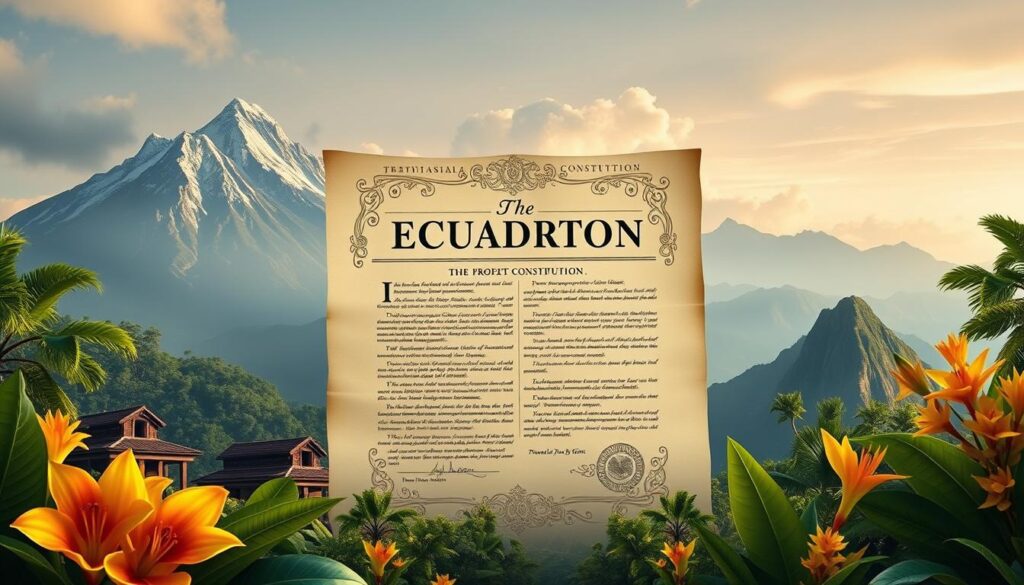
For those intrigued by the possibilities of property ownership in Ecuador, understanding legal frameworks is imperative. The Ecuador constitution and property ownership safeguards the rights of foreigners wishing to engage in real estate transactions within the country. International investors will be pleased to know that Ecuador permits the ownership of property by foreigners from any country, guaranteeing equality under the law.
Constitutional Rights and Restrictions
The Foreigner property purchase regulations in Ecuador are grounded in the country’s constitution, which explicitly grants foreigners the same rights as locals when it comes to property ownership4. This means any international investor or non-resident can purchase, own, and even transfer real estate without facing discriminatory restrictions. Noteworthy, however, is the requirement for fluency in Spanish to legally participate in the notary process during the finalization of property transactions, unless a translator is present4.
Protected Areas and National Security Concerns
While real estate investment laws in Ecuador are supportive, some restrictions are imposed in ecologically sensitive and strategic zones. Ecuador’s commitment to preservation is evident through stricter protocols for areas of natural significance, such as the Galápagos Islands, a UNESCO World Heritage Site6. Additionally, properties in proximity to military bases or borders may face limitations to ensure national security.
Regulations for Agricultural Land
Purchasing agricultural land involves a distinct set of foreigner property purchase regulations in Ecuador. The government places a protective stance surrounding its agricultural resources, which may necessitate obtaining approvals or complying with specific directives. This requirement demonstrates Ecuador’s strategy to safeguard and sustain its valuable agricultural industry and resources4.
Understanding these real estate investment laws in Ecuador ensures a secure and strategic approach when entering the property market, particularly for those looking to benefit from the equal rights provided by the Ecuador constitution and property ownership policies.
Popular Locations to Buy Property in Ecuador

Exploring the prime real estate locations in Ecuador reveals a diverse landscape catering to various preferences. From vibrant urban centers to serene coastal retreats, the nation boasts several hotspots that are attracting both local and international investors.
Quito: The Capital City
Quito, the bustling capital, is a central figure among Quito and Cuenca properties. Renowned for its colonial charm and modern amenities, the city offers a range of property types including houses, apartments, and commercial spaces7. The dynamic property market here reflects the city’s growing demand for real estate investments.
Cuenca: A Cultural Hub
Cuenca, a UNESCO World Heritage site, is celebrated for its cultural richness and historical significance. It’s a favored location for those seeking a blend of traditional and contemporary living7. The rising interest in Quito and Cuenca properties illustrates Cuenca’s appeal as both a cultural hub and a modern residential haven.
Coastal Areas: Manta and Salinas
Manta and Salinas are prime targets for those looking at Manta and Salinas beachfront investments. These coastal gems offer extensive opportunities for beachfront properties, secondary homes, or vacation houses8. Despite the pandemic-triggered economic challenges, Salinas showed an increase in housing projects due to a growing interest in coastal retreats9.
Emerging Areas: Cotacachi and Loja
The up-and-coming real estate in Cotacachi and Loja is gaining traction for their scenic beauty and calm atmospheres. These areas are ideal for investors seeking properties in tranquil settings with the potential for future appreciation9. Cotacachi and Loja offer a mix of residential and development lands, catering to diverse investment strategies.
Overall, prime real estate locations in Ecuador present a plethora of options, from Quito and Cuenca properties to Manta and Salinas beachfront investments, and the up-and-coming real estate in Cotacachi and Loja.
Visa Options for Buying Property
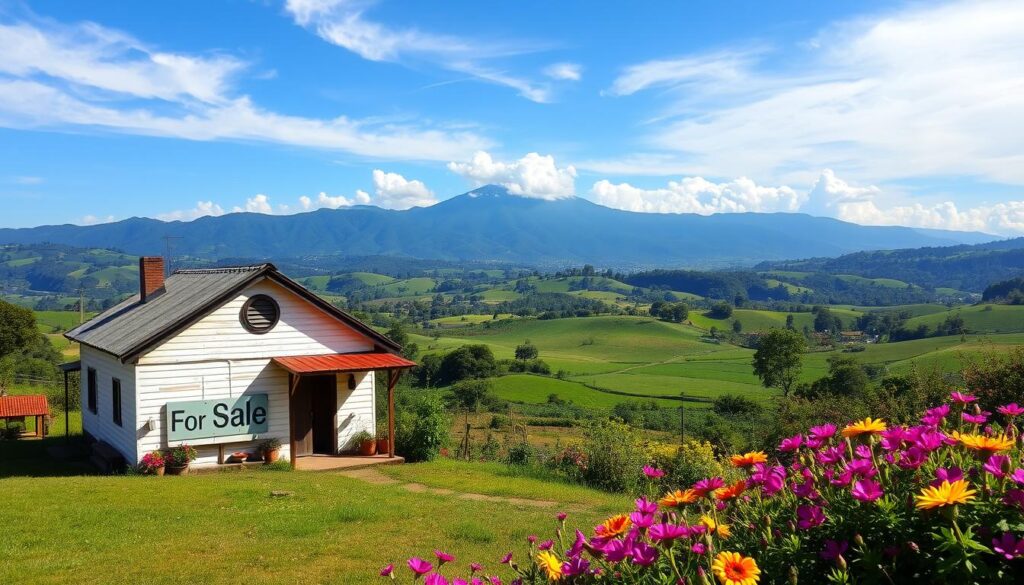
When considering purchasing property in Ecuador, understanding the available visa options is crucial. Foreign nationals have access to various residency routes, each tailored to different needs and circumstances.
Temporary Residency Visa Types
Several types of Ecuador temporary residency visas cater to individuals aiming to reside in the country for an extended period. Common options include Professional, Investor, and Pensioner visas. For instance, the investor visa entails an initial minimum investment of $45,000, which can be made through a Poliza account, real estate, or business investment10. Cities in Ecuador where one can apply for an investor’s visa include Quito, Guayaquil, Machala, Manta, Azogues, and Tulcán10. Each visa type has specific documentation and financial requirements, detailed in our investment visa guide here.
The low cost of living in Ecuador and safety make it an attractive destination for expatriates from Europe and North America11. Investor visas in Ecuador generally cost significantly less than similar visas in other regions, enhancing their appeal11.
Permanent Residency Visa and Requirements
After maintaining a temporary residency for two years, individuals become eligible to apply for permanent residency in Ecuador. Permanent residency allows foreigners to enjoy extended benefits and integrate more deeply into Ecuadorian life. Unlike temporary visas, permanent residency offers better stability as it does not need frequent renewals, and it can eventually lead to citizenship after four years of residence11.
For those on a Rentista visa, meeting the income requirement of approximately $1,275 per month and an additional $250 per dependent is necessary11. To secure tax residency status, one must spend at least 183 days in Ecuador annually11.
Working with a Lawyer for Visa Applications
Given the intricacies of the visa application process, obtaining legal assistance for Ecuadorian visas is highly recommended. Legal experts can streamline the process, ensuring all requirements are met efficiently. They can also assist with translating documents, notary services, and managing assorted fees, including the average $50 for notary services and $150 for translation services10. By partnering with trustworthy legal professionals, applicants can navigate regulatory hurdles with greater ease and confidence.
Can Foreigners Buy Real Estate in Ecuador?
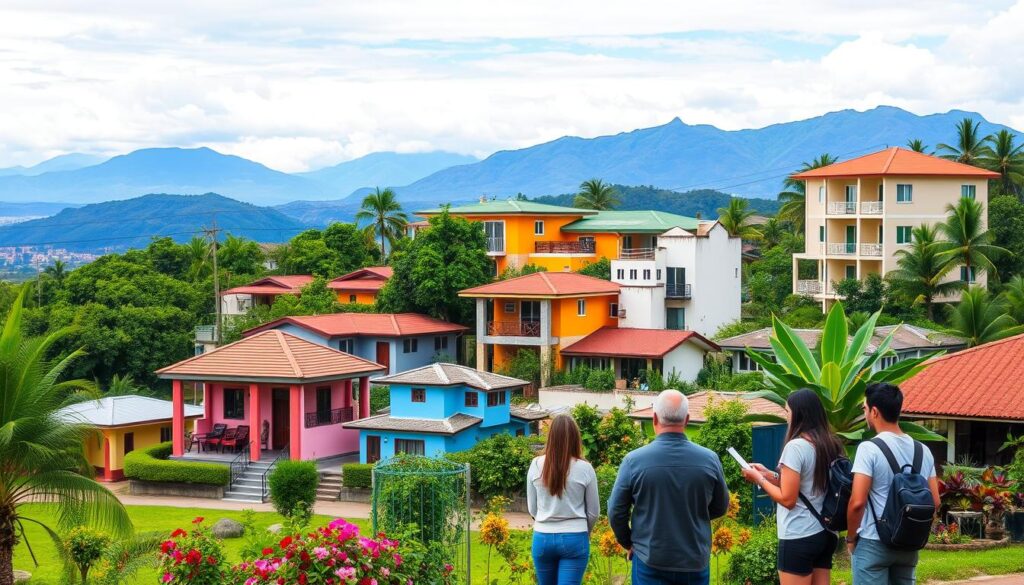
Foreigners can legally own property in Ecuador, making it an appealing option for non-citizens buying property in Ecuador. With the same property buying rights as locals, the Ecuador real estate market for foreigners offers a seamless process, though certain restrictions do apply12. For example, there are limitations on purchasing land near international borders and protected areas12. It’s essential to work with a reputable local real estate agent and a lawyer to navigate these legalities12.
Financial planning is crucial when it comes to expats homeownership in Ecuador. Buyers should budget for property prices, taxes, maintenance, insurance, and legal fees12. Property taxes in Ecuador are typically less than $300 a year, which makes it an attractive destination for property investment6. Closing fees range between $2,000 and $3,000, depending on the property’s specifics6.
Ecuador is divided into four diverse regions: the coast, the Andes mountains, the Amazon, and the Galapagos Islands6. Each region offers a unique living experience and varied opportunities for expats. Before finalizing a purchase, it’s recommended to conduct a thorough property inspection to ensure the property’s condition meets your expectations12.
For those considering long-term residency, Ecuador offers several types of Temporary Residency Visas, including professional, investor, and pensioner visas6. The investor visa requires a minimum investment of $25,000, which could be met by purchasing qualifying property6. Investment properties in Ecuador often provide attractive annual rates of return, adding another layer of appeal for expats13.
Regardless of whether you’re making a full cash purchase or opting for an installment plan over a 6-12 month period, the process is straightforward13. Although securing a mortgage as a foreigner may be challenging initially, many expats find success using international bank wire transfers to complete their purchases13. Working with an Ecuadorian Real Estate Attorney is highly recommended to handle the legal and procedural aspects effectively13.
Contact us if you are Interested in Buying Property Abroad!
Steps to Purchasing Property in Ecuador
Purchasing Real Estate in Ecuador for Non-residents involves several meticulous steps to ensure a successful transaction. From beginning the property search to finalizing the transfer, you’ll need careful attention to detail and local expertise.
Property Search and Inspection
The initial step in the Ecuador property buying steps is conducting a comprehensive property search. Engage local real estate agents and visit various properties to find the perfect one. It’s recommended to perform a thorough Property inspection and legal procedures in Ecuador are a must to identify potential issues with structural integrity or legal status.
Making an Offer and Purchase Agreement
Once you select a property, the next step is to make an official offer. The offer should be based on comparable properties and your budget. During this phase, drafting a purchase agreement is crucial to outline the terms and conditions of the sale, including the price and any contingencies.
Legal Checks and Notary Public Involvement
After the purchase agreement, conducting legal checks is necessary to ensure there are no outstanding debts or legal issues tied to the property. Hiring a local lawyer and notary public is critical for verifying documents and overseeing the legal formalities12. Property inspection and legal procedures in Ecuador often require these professionals to ensure adherence to local laws14. For detailed guidance on the property-buying process, refer to detailed steps in this post.
Finalizing the Property Transfer
The final step involves transferring ownership, which includes signing the final documents and registering the property under your name. This process typically occurs at the notary’s office. Closing fees, property taxes, and additional charges should be budgeted realistically12. For a seamless experience, ensure legal support throughout these steps to address any issues that may arise.
Costs Involved in Buying Property
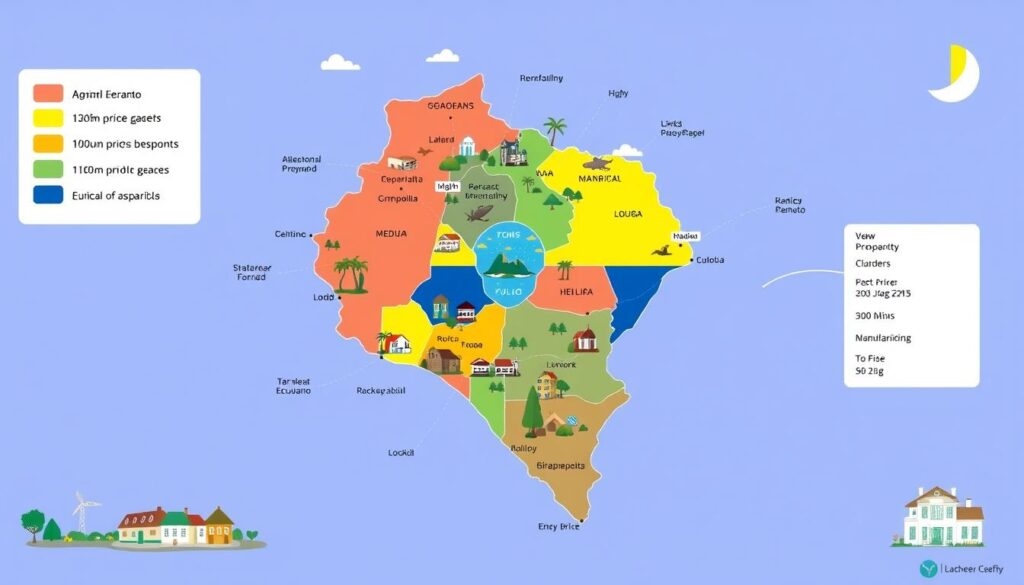
Understanding the financial obligations associated with purchasing real estate in Ecuador is crucial for potential buyers. These costs encompass property prices, closing fees, property taxes, and any hidden expenses that may arise.
Property Prices and Regional Variations
The cost of property in Ecuador exhibits significant variation across different regions. In urban centers like Quito and Cuenca, property prices tend to be higher due to factors such as quality of construction, level of luxury, and available amenities15. For instance, a high-end apartment in Quito might fetch premium rates compared to a similar property in rural areas where land accessibility and agricultural potential play a significant role in valuation16. Real estate prices in Ecuador are influenced by a myriad of variables, and navigating these regional property price variations in Ecuador is essential for an informed investment decision.
Closing Fees and Property Taxes
Closing fees and taxes on Ecuadorian properties form an integral part of the buying process. Typically, closing costs for real estate transactions range from $2,500 to $3,500, encompassing legal fees, Property Register fees, Notary fees, and a transfer tax of 1.1% of the assessed value15. Furthermore, Ecuador real estate costs often include annual property taxes assessed at a rate of roughly 2% to 2.5% of the purchase price, although some regions like Cuenca boast impressively low tax rates, often under $300 per year17. These closing fees and taxes are relatively low, making property investment in Ecuador an attractive option.
Hidden Costs and Additional Fees
Besides the obvious expenses, buyers must also be aware of hidden costs and additional fees involved in purchasing property in Ecuador. These can include legal services, typically amounting to less than 2% of the purchase price, and commission fees charged by real estate agents, usually equivalent to 3% of the final negotiated sales price17. It’s also common for buyers to delegate the signing of documents via Power of Attorney to attorneys or representatives when they cannot be present, incurring additional costs16. Awareness of these hidden costs is crucial as they can notably affect the overall Ecuador real estate costs, ensuring you make a well-rounded investment.
Working with a Real Estate Lawyer
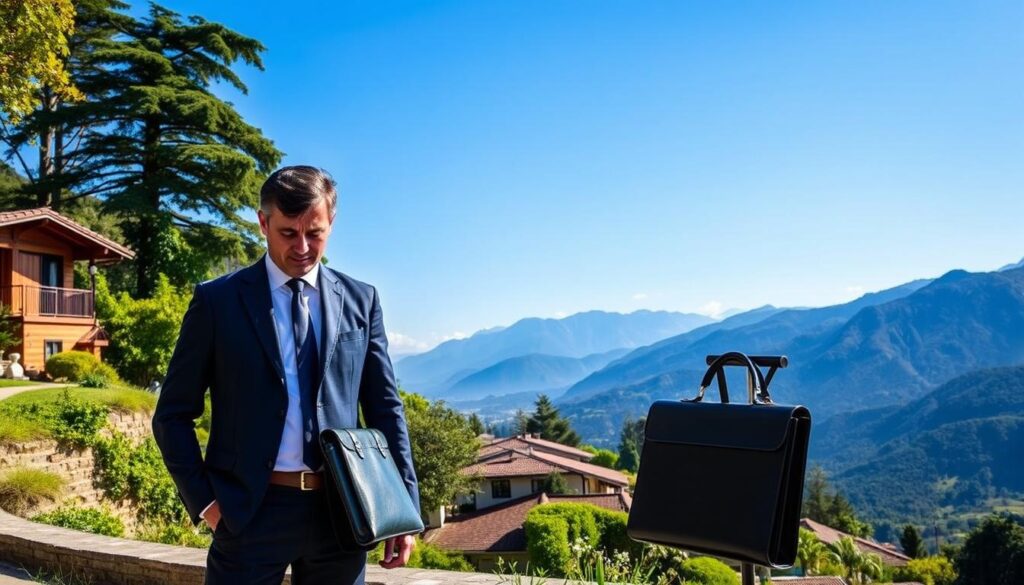
Engaging with a reputable lawyer is paramount when navigating the Ecuadorian real estate market. A reliable legal professional can provide essential Ecuador real estate legal assistance, ensuring that your property investment is secure and compliant with local laws.
Finding a Reputable Lawyer
When choosing a lawyer in Ecuador, ensure they are referenced through the Ecuadorian Bar Association. This affiliation guarantees that the lawyer adheres to strict professional standards. Reputable lawyers, like Andrea from The Wandering Investor provide comprehensive services for real estate18.
Legal Fees and Services
Understanding the scope of legal fees and services is crucial. Legal fees can vary significantly based on the complexity of the property transaction. It is essential to confirm the costs and extent of services upfront to avoid any unexpected expenses. Services typically include property title search, contract review, and transaction management, providing comprehensive Ecuador real estate legal assistance.
Importance of Legal Due Diligence
Legal due diligence for property purchase involves thorough checks to ensure the property is free of liens, encumbrances, and other legal issues. This process safeguards your investment and prevents future disputes. Engaging a lawyer for due diligence not only ensures compliance but also offers peace of mind.
In Ecuador, the lawyer’s role in due diligence extends beyond simple paperwork. They meticulously review property titles, permits, and zoning issues to provide comprehensive legal protection for buyers.
Remember, when purchasing property as a foreigner in Ecuador, you are subject to the same taxes and regulations as Ecuadorian citizens18. Legal due diligence for property purchase is an indispensable step in securing a successful and hassle-free property transaction.
Health and Safety Considerations for Expats
Relocating to Ecuador requires planning, especially when it comes to health and safety. Expat health care in Ecuador is generally of high quality, with numerous options available in major cities.
Health Care Options and Insurance
In Ecuador, healthcare facilities are readily accessible in urban centers like Quito, Guayaquil, and Cuenca. The government mandates that expats secure health insurance as part of the health insurance requirements for Ecuadorian residency. This ensures that expats have access to both public and private healthcare services, allowing them to choose the level of care that suits their needs.
For those concerned about staying safe in Ecuador, it’s advisable to understand the local healthcare landscape. Many hospitals offer services from English-speaking medical professionals, making it easier for expats to receive care.
While Ecuador does not mandate purchasing title insurance during real estate transactions, the requirement for health insurance underlines the importance placed on personal well-being and safety in the country19. Expats need to ensure that their health insurance covers all necessary medical treatments, including emergency services.
Safety Concerns and Recommendations
When it comes to staying safe in Ecuador, following local guidelines and remaining vigilant are crucial. The country’s approach to public safety is generally proactive, yet, as in any destination, it’s important to stay aware of your surroundings. Utilizing local transportation methods such as taxis and buses is not only economical but also fairly safe; a taxi ride in Ecuador typically costs around $3 for a 10-minute journey, and bus rides within cities like Cuenca are less than 50 cents, offering an efficient way to travel20.
Health and safety considerations for expats also include understanding local risks and taking precautions. Acquiring travel insurance is recommended for mitigating risks related to trip cancellations and health emergencies.
In summary, expat health care in Ecuador is comprehensive, supported by stringent health insurance requirements. Staying aware of your environment while following local safety recommendations will further enhance your experience in this vibrant country.
Cultural and Logistical Tips for Living in Ecuador
Relocating to Ecuador offers a unique blend of cultural enrichment and logistical adjustments. For many expats, integrating into the Ecuadorian society often entails navigating language barriers and mastering the nuances of everyday living logistics.
Language Barriers and Spanish Lessons
Understanding the local language is a crucial aspect of cultural adjustment in Ecuador. While Spanish is the official and widely spoken language, a minority also speaks Quechua. Thus, Spanish language learning for expats becomes imperative to engage effectively with locals and fully experience the rich cultural tapestry. Programs such as intensive language courses or private tutors can greatly facilitate this learning process.
Embracing the Ecuadorian Lifestyle
Adopting the Ecuadorian lifestyle requires flexibility and a willingness to embrace new customs and traditions. Life in Ecuador is often slower-paced and community-oriented. Expats will have to adjust to fewer familiar brands and the prevalence of local markets. Exploring geographical wonders like the Galapagos Islands, considered a UNESCO World Heritage Site, can enrich one’s appreciation of the country’s diversity21. Additionally, Quito, another World Heritage Site, attracts many for its cultural and historical significance22.
Sending and Receiving Mail
The Ecuador living logistics can be a bit challenging when it comes to the postal system. Sending and receiving mail may experience delays, and it’s not uncommon for packages to take several weeks to arrive from overseas. To mitigate this, many expats opt for private courier services for more reliable delivery. It’s also beneficial to inform family and friends about these potential delays to set realistic expectations.
To explore more about life in Ecuador and make informed decisions, visiting resources like the expat newsletter on Ecuador Home Sales can provide valuable insights and tips22.
Property Investment Potential in Ecuador
The property investment potential in Ecuador is increasingly being recognized due to favorable investment conditions and emerging market trends.
Trends in the Property Market
There is a growing interest in Ecuador property investment trends, driven primarily by affordable prices and the country’s unique economic landscape. Properties in Ecuador typically range from $120K to $150K, providing significant value when compared to other South American countries and the US23.
Short-Term Rentals and Co-living Spaces
With the rise of remote work and digital nomads, the profitability in short-term rentals has surged. The demand for co-living spaces is particularly high in cities like Cuenca, which ranks highly among desirable places to relocate23. Ecuador’s vibrant tourism industry further bolsters this sector, making short-term rentals a lucrative venture24.
Long-term Investment Prospects
Long-term property investing in Ecuador is attractive due to several factors. The country’s official dollarization enhances economic stability, while low property taxes and steady economic growth offer additional incentives2423. Additionally, Ecuador’s GDP growth, although relatively stagnant, shows promise with ongoing infrastructure investments and inclusive economic policies2423.
In summary, Ecuador stands out for its strong property investment potential. With a stable currency, low taxes, and a burgeoning rental market, it offers various opportunities for both short-term profit and long-term growth.
Conclusion
Final thoughts on buying real estate in Ecuador reveal a mosaic of opportunities, buoyed by a welcoming attitude toward foreign investors and an array of lifestyle options. Engaging in successful property investment in Ecuador requires thorough due diligence, including reviewing property titles and scrutinizing for potential liens and encumbrances, ensuring a smooth acquisition process25. With property taxes based on assessed municipal value, typically ranging from 2% to 2.5% of the purchase price, the financial burden remains relatively light15. Furthermore, employing skilled negotiation tactics and precise contract drafting can significantly mitigate legal risks involved in real estate transactions25.
The diversity of geographical locales, from urban centers like Quito to coastal regions such as Manta, offers a wide variety of choices for potential buyers. This means that property seekers should allocate time and resources to explore different regions to find the ideal property, considering the vast geographical diversity of the country15. Legal advisories recommend having an Ecuadorian will drafted by an attorney, costing less than $200, to ensure seamless transfer of assets to heirs4. Closing costs, which typically range from $2,500 to $3,500, and real estate agent fees, often included in the final purchase price, should also be anticipated in the buy-sell process15.
By approaching the Ecuadorian property market with a well-researched and methodical plan, leaning on local legal expertise for contract finalizations and ensuring every action aligns with the country’s legal framework, investors can look forward to a rewarding and successful property investment in Ecuador. Embracing this holistic approach will not only protect investments but also enhance the owning experience in this diverse and welcoming country, making it a truly compelling option for real estate acquisition.
Contact us if you are Interested in Buying Property Abroad!
FAQ
Can Foreigners buy Real Estate in Ecuador?
Yes, foreigners can buy real estate in Ecuador with few legal restrictions, securing the same ownership rights as Ecuadorian nationals.
What legal rights do foreigners have when purchasing property in Ecuador?
The Ecuadorian constitution grants expansive property rights to foreigners, similar to those enjoyed by local citizens. However, certain natural areas of national importance are subject to stringent protocols to ensure ecological preservation.
Are there any specific regulations for foreigners purchasing agricultural land in Ecuador?
Yes, foreigners may need government approval to purchase agricultural land. This reflects Ecuador’s protective stance toward its agricultural industry and resources.
What are some popular locations for buying property in Ecuador?
Popular locations include urban centers like Quito and Cuenca, coastal regions such as Manta and Salinas, and emerging markets in Cotacachi and Loja, each offering unique landscapes and investment opportunities.
What visa options are available for foreigners looking to buy property in Ecuador?
Various visas are available, including Professional, Investor, and Pensioner visas. These can lead to Permanent Residency after maintaining temporary status for two years.
What are the steps involved in purchasing property in Ecuador?
The process generally involves a property search, inspection, making an official offer, drafting a purchase agreement, legal checks, notary public involvement, and finalizing the property transfer. Collaborating with local real estate lawyers can ensure a smooth process.
What are the typical costs involved in buying property in Ecuador?
Property prices vary by region, with higher rates in premium locales like Quito. Closing fees and property taxes are generally lower compared to many countries, typically under 0 annually. Hidden costs may include legal services and additional fees.
How important is it to work with a real estate lawyer when buying property in Ecuador?
Engaging a reputable lawyer is crucial. They navigate the legal landscape, ensure due diligence, and provide a range of services to protect your investment. Confirm costs and services upfront to avoid surprises.
What health care options and requirements exist for expats in Ecuador?
Major cities offer commendable healthcare. Expats must secure health insurance as mandated by law, ensuring access to necessary medical services.
How can expats adjust to the cultural and logistical aspects of living in Ecuador?
Learning Spanish is advisable as it is the dominant language. Embracing the Ecuadorian lifestyle, which values a slower, family-centric approach, and adjusting to logistical differences like fewer name-brand imports and slower postal services require flexibility.
What is the investment potential in Ecuador’s property market?
The market is favorable for sustainable living and remote work trends, with growing demand for short-term rentals in tourist areas and promising long-term investment prospects due to Ecuador’s stable currency and attractiveness as a retirement destination.
Source Links
- https://www.expatfocus.com/ecuador/guide/ecuador-buying-property
- https://internationalliving.com/countries/ecuador/real-estate/
- https://multilaw.com/Multilaw/Multilaw/RealEstate/Real_Estate_Guide_Ecuador.aspx
- https://ecuadoratyourservice.com/blog/buying-real-estate-ecuador
- https://www.offshorelivingletter.com/investing-in-beachfront-and-city-real-estate-in-ecuador/
- https://www.ecuadorhomesales.com/newsletter/10-things-to-know-before-moving-to-ecuador
- https://www.realtor.com/international/ec/
- https://www.overseaspropertyalert.com/earn-residency-by-buying-property-in-these-five-top-countries/
- https://www.ecuaassist.com/single-post/is-it-a-good-idea-to-buy-real-estate-in-ecuador-everything-you-need-to-know-about-the-real-estate
- https://travelislife.org/ecuador-investors-visa-instructions/
- https://nomadcapitalist.com/global-citizen/how-to-get-ecuador-residency-and-citizenship-by-investment/
- https://www.owninecuador.com/blog/tips-for-expats-buying-property-in-ecuador
- https://ecuadorvisas.com/articles/buying-property-in-ecuador-what-you-need-to-know/index.html
- https://www.expatexchange.com/eetr/79362/39/10/real-estate-in/ecuador/Tips-for-Buying-Propery-in-Ecuador
- https://www.ecuadorhomesales.com/buying-property-in-ecuador
- https://www.abecuador.com/single-post/2017/01/11/real-estate-in-ecuador-an-overview
- https://www.cuencasbestproperties.com/thepurchaseprocess.php
- https://www.expatexchange.com/gdviewtr/73/1/39/Ecuador/Are-foreigners-allowed-to-own-property-in-Ecuador?
- https://www.life-in-ecuador.com/buying-property-in-ecuador.html
- https://ecuadorvisas.com/faq.html
- https://rebeccaadventuretravel.com/blog/ecuador/10-reasons-why-ecuador-is-the-perfect-destination/
- https://digitalnomads.world/city-guide/quito/
- https://livethelifeinecuador.com/financing-your-property-in-ecuador/
- https://thewanderinginvestor.com/international-real-estate/full-guide-to-making-a-real-estate-investment-in-cuenca-ecuador/
- https://www.ecuaassist.com/single-post/things-tips-you-should-know-about-purchasing-real-estate-in-ecuador-2024

Comments